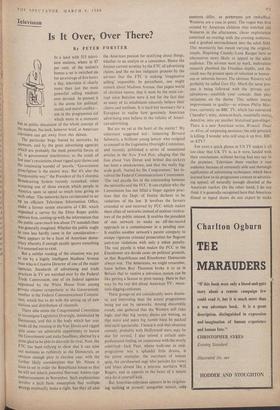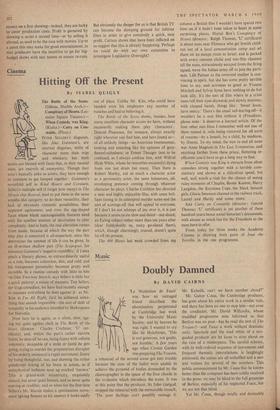Television
Is It Over, Over There?
By PETER FORSTER The particular bogy feared by networks, by sponsors, and by the great advertising agencies which are probably the most powerful forces of all, is government interference, as the result of last year's revelations about rigged quiz shows and the continuing scandal of `payola.' Government prescription is the easiest way. But it's also the irresponsible way !' the President of the Columbia Broadcasting System recently remarked, when accepting one of those awards which people in America seem to spend so much time giving to each other. The networks have co-operated to set UP an -efficient Television Information Office, under a former senior executive of CBS. which organised a survey by the Elmo Roper public opinion firm, coming up with the information that the public cares much less about TV scandals than Was generally imagined. Whether the public ought to care less hardly came in for consideration— there appears to be a facet of American demo- cracy whereby if enough people ignore something it is assumed not to exist.
But a subtler reading of the situation was put to me by a highly intelligent Madison Avenue man who is Creative Director of one of the major agencies. Standards of advertising and trade practices in TV are watched over by the Federal Trade Commission, one of six federal agenCies appointed by the White House from among private citizens sympathetic to the Government; another is the Federal Communications Commis- sion, which has to do with the setting up of new stations and distribution of channels.
There also exists the Congressional Committee to investigate Legislative Oversight, dominated by Democrats, and this is the body which last year made all the running in the Van Doren and rigged quiz cases—an admirable opportunity to harass the Government and make headlines, abetted by a press glad to be able to discredit its rival. Now, the FTC has been rallying to shoW that it can nose out nastiness as ruthlessly as the Democrats, an obvious enough ploy in election year, with the further likely consideration that Mr. Nixon is keen to set in order the Republican house so that he will not inherit potential Sherman Adams-type embarrassments in November. Such explanations involve a tacit basic assumption that multiple wrongs eventually make a right, but they all abet the American passion for testifying about things, whether to an analyst or a committee. Hence the furious current scrutiny by the FTC of advertising claims, and the no less indignant protests by the ad-men that the FTC is making 'imaginative selling' impossible. In parenthesis, one might remark about Madison Avenue, that pagan world of christian names, that it must be the most cor- rupt since Babylon were it not for the fact that so many of its inhabitants sincerely believe their claims and methods. It is hard but necessary for a European to realise how genuinely American advertising men believe in the validity of Ameri- can advertising.
But are we yet at the heart of the matter? My informant suggested not : instancing Bernard Schwartz, a brilliant young lawyer who resigned as counsel to the Legislative Oversight Committee, and recently published a series of sensational articles in the New York Post, alleging that the fuss about Van Doren and bribed disc-jockeys has been a smokescreen, and that the really big- scale graft, 'buried by the Congressmen,' has in- volved the Federal Communications Commission. `The real payola lies in the relationship between the networks and the FCC. It can explain why the Commission has not lifted a finger against prac- tices that the Dept. of Justice declares to be violations of the law. It involves the favours extended to and received by FCC which makes them allies of networks instead of zealous vindica- tors of the public interest. It enables the president of one network to make an off-the-record approach to a commissioner in a pending case. It enables another network's parent company to escape vigorous criminal prosecution for flagrant anti-trust violations with only a token penalty. The real payola is what makes the FCC in the Eisenhower era decide cases on political grounds, so that Republicans and Eisenhower Democrats always win.' The Americans, we might remember, knew before Roy Thomson broke it • to us in `Britain that to receive a television station can be like getting a licence to print money. Here in fact may be the real dirt about American TV : mean- tinie digging continues.
These goings-on are considerably more drama- tic and interesting than the actual programmes being put out by networks. Among discernible trends, one gathered that the Western still rides high; and that big variety shows are waning, so that more and more big names must be packed into each spectacular. I heard it said that situation comedy, probably with Hollywood stars, may be due for revival. I also sensed a certain anti- professional feeling, an impatience with the overly contrived—Jack Paar, whose walk-out in mid- programme was a splendid little drama, is the prime exemplar, the merchant of instant quip, the unrehearsed sage MI6 parades his views and blues almost like a neurotic northern Will Rogers, and so appeals to the heart of a nation on.a do-it-yourself kick. .
But American television appears to be originat- ing nothing at present; categories remain, only contents differ, as prototypes are reshuffled. Westerns are a case in point. The vogue was first created by American children who watched old Westerns in the afternoons; clever exploitation contrived an overlap with the evening audience, and a gradual encroachment into the adult field. This necessarily has meant varying the original, simple, Hopalong Cassidy/Lone Ranger hero to alternatives more likely to appeal to the adult audience. The ad-men went to work, motivation research plumbed the Freudian depths, and the result was the present spate of reluctant or humor- ous or unheroic heroes. The ultimate Western will probably be called Gun Shy. Much the same pro- cess is being followed with the 'private eye' adventures—establish your' concept, then play variations on the theme. This seldom means improvement in quality—as witness Philip Mar- lowe, currently on BBC TV, which has converted Chandler's witty, down-at-heels, essentially moray, detective, into yet another brutalised-gun-slinger. There is a new American series, Wanted: Dead or Alive, of surpassing nastiness; the sole gimmick is killing. I wonder who will snap it up first, BBC or ATV?
For even a quick glance at US TV makes it all too clear that UK TV is, as it were, landed with their conclusions, without having had any say in the premises. Television there reaches a vast audience because of extremely able and thorough application of advertising techniques, which have learned how to tie programme content to advertis- ing appeal, all naturally enough directed at the American market. On the other hand, I do not think it is generally recognised here that American filmed or taped shows do not expect to make
money on a first showing—indeed, they are lucky to cover production costs. Profit is garnered by showing a series a second time—or by selling it abroad, as used to be the case with movies. Up to a point this may make for good entertainment, in that producers have the incentive to go for big- budget shows with star names to ensure re-runs. But obviously the danger for us is that British TV can become the dumping ground for inferior films in order to give somebody a quick, easy profit. Certain shows that have been inflicted on us suggest that this is already happening. Perhaps we could do with our own committee to investigate Legislative Oversight?



































 Previous page
Previous page